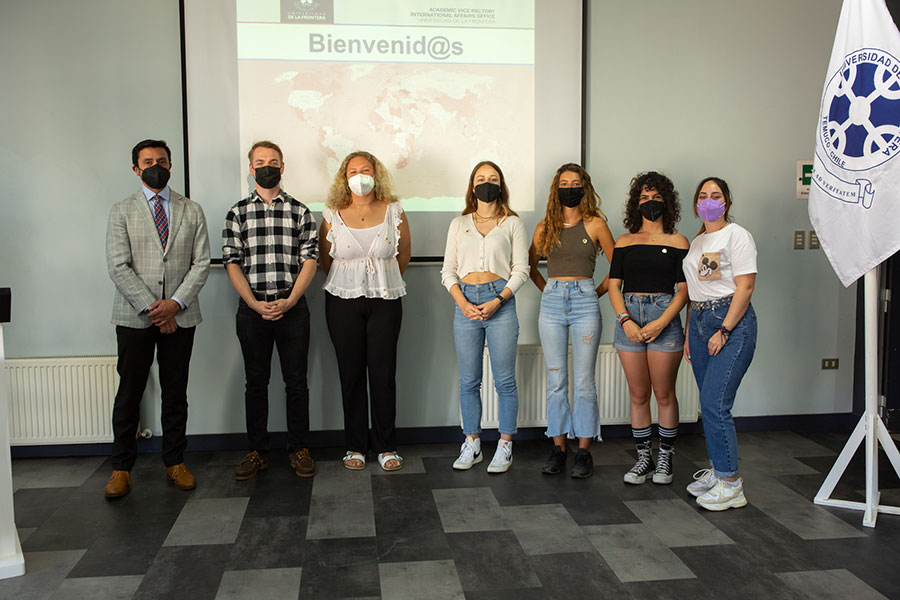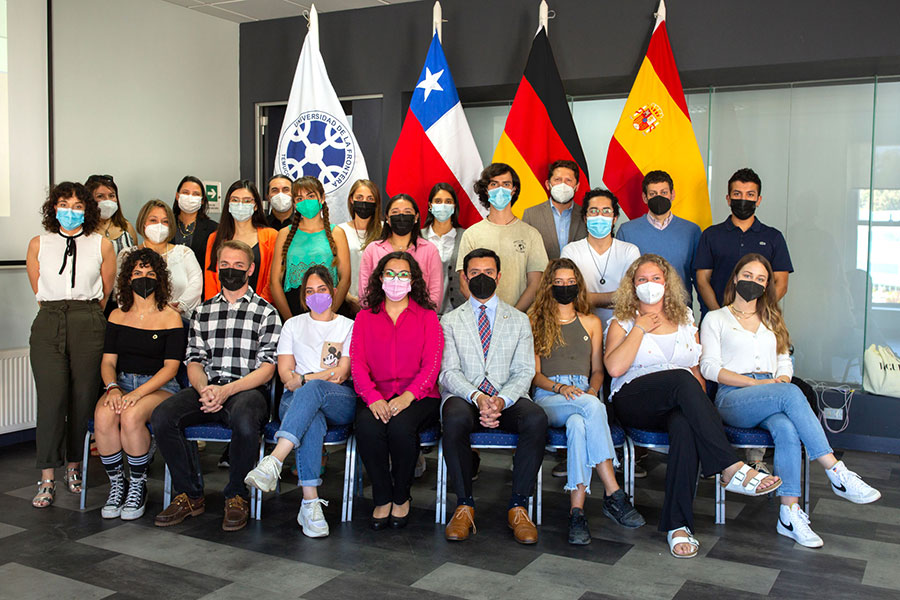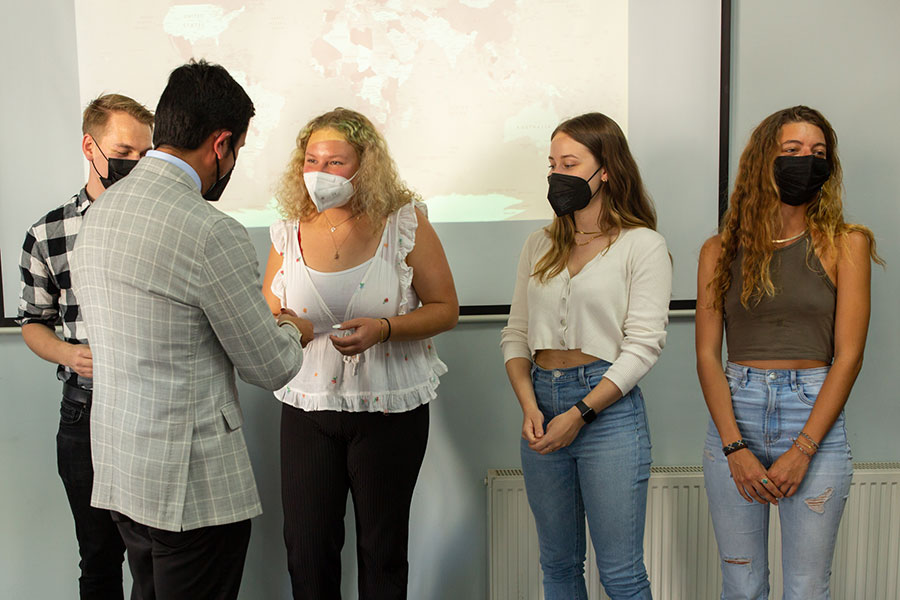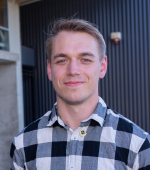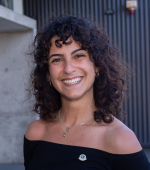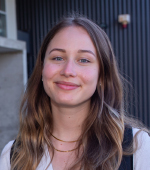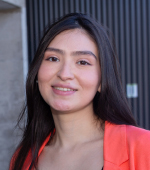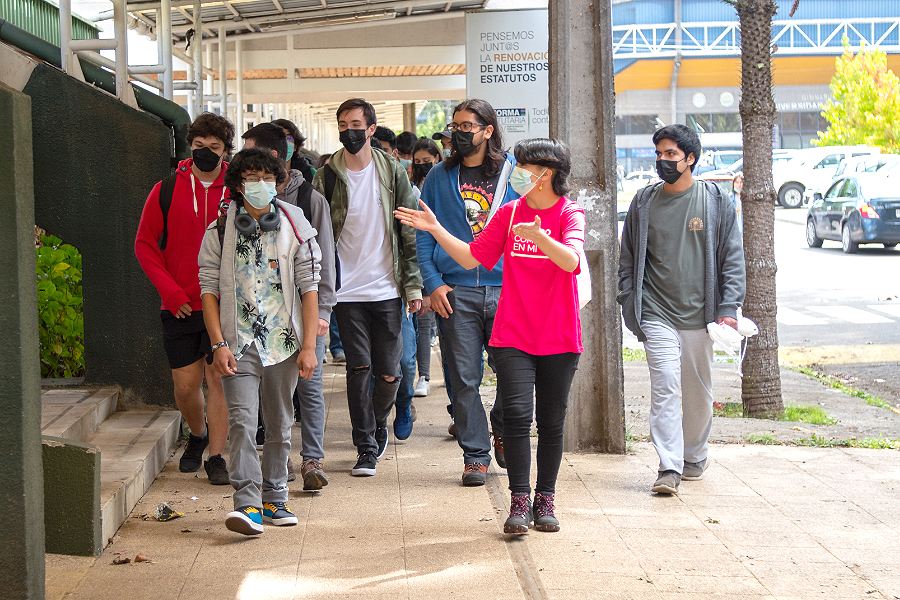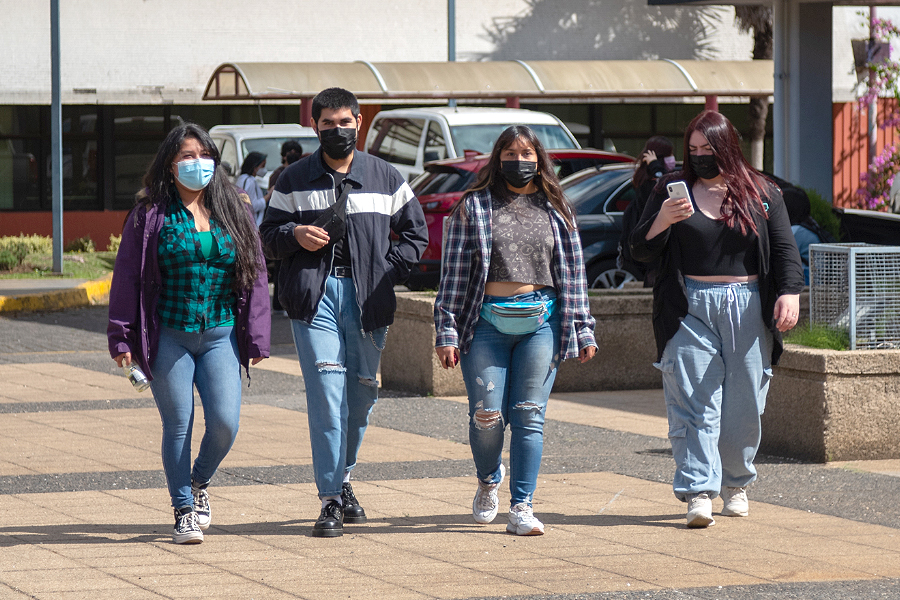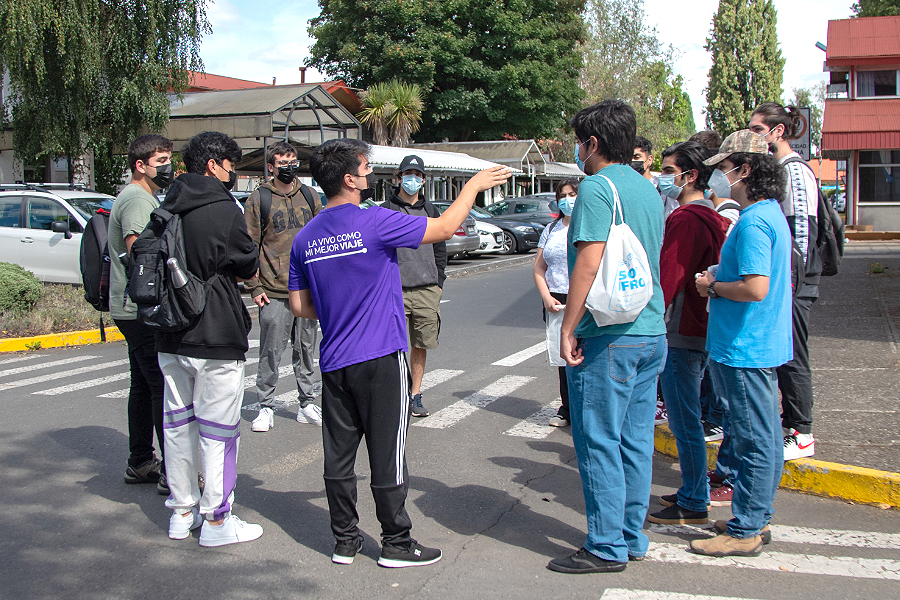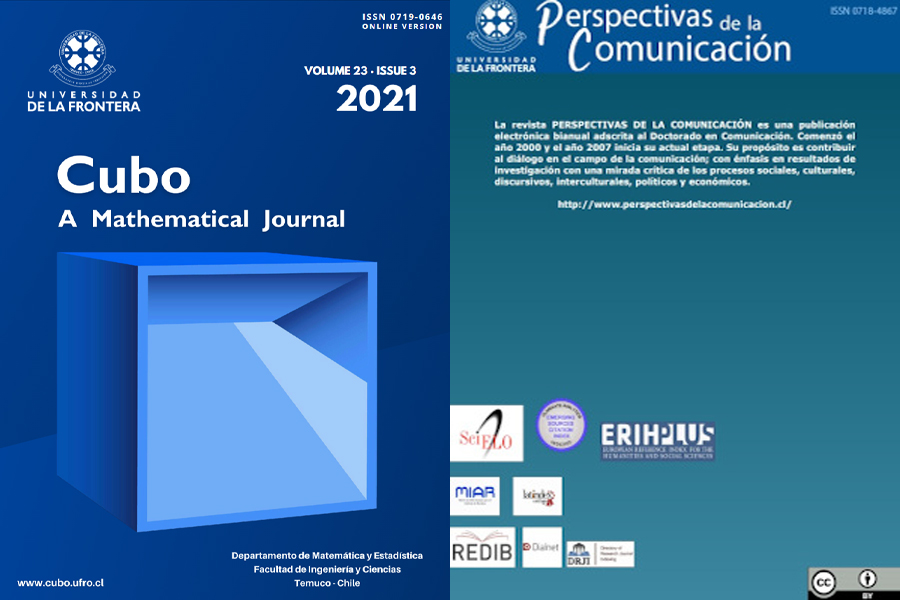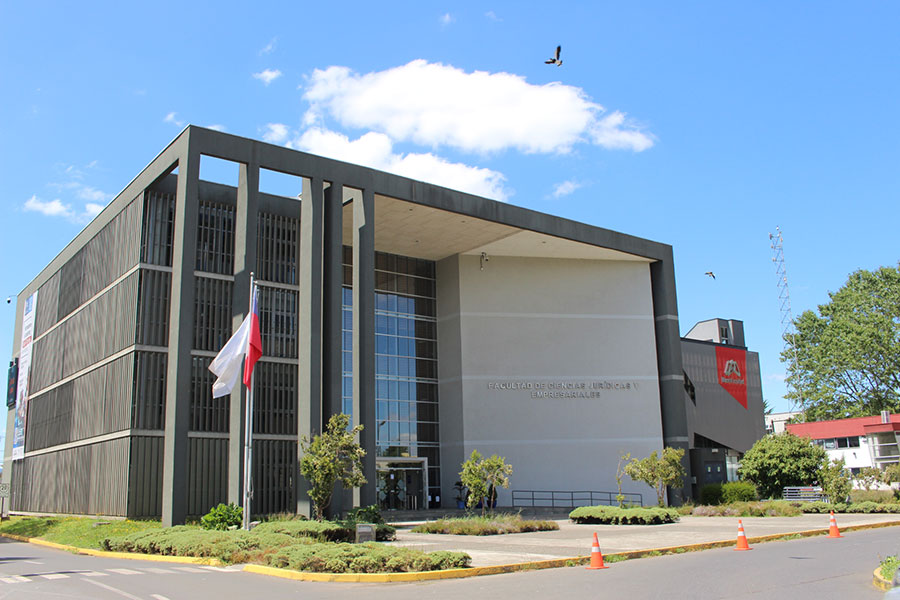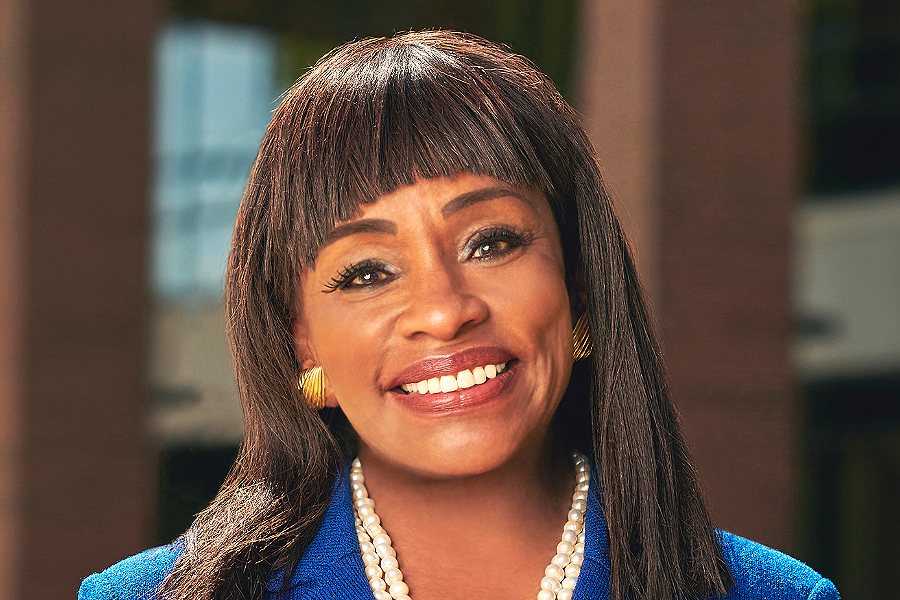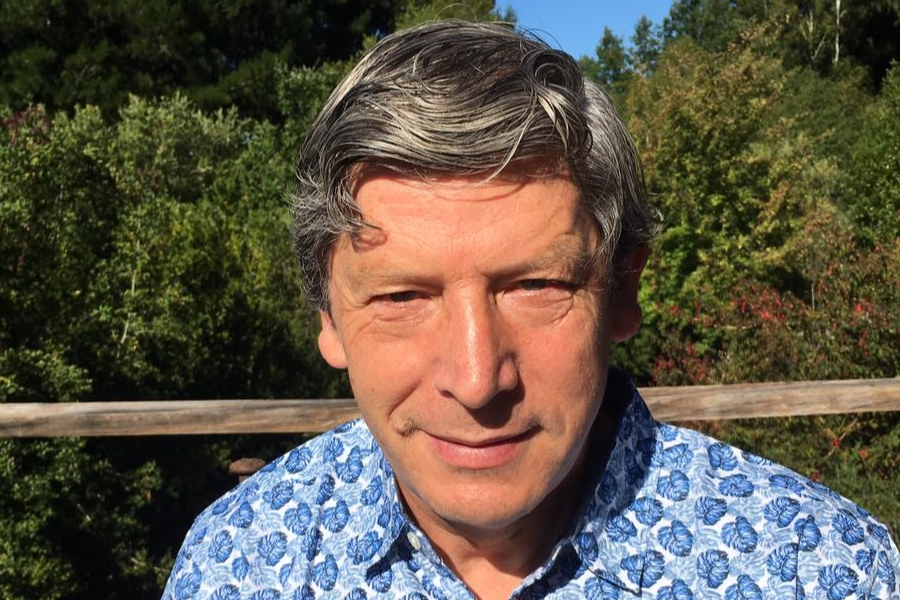|
These six international students represent the reactivation of the inbound student mobility at UFRO after the pandemic, during which the students were only able to participate via classes, conferences and meetings online. |
The International Affairs Office and the Student Mobility Office of the Universidad de La Frontera (UFRO) organized a welcome event together with the Office for Comprehensive Training and Employability and the Language Coordination Center for the six students from Germany and Spain, giving them valuable information for the first days in Chile, Temuco and at the university. Some of the topics at this welcome ceremony were the English, German, French and Portuguese language courses offered by the Language Coordination Center (CODI) and the variety of student groups, which are more than 90, and the issues they address, which the Office of Student Development presented. Besides the subjects in their fields of studies, the students were able to select elective subjects and programs that are part of the undergraduate programs at UFRO. After these organizational issues, the students participated in a city tour organized by the program “UniverCiudad” (“UniverCity”) and the municipality of the city of Temuco in order to get to know the city they are going to live in. This city tour included public spaces such as the natural monument “Cerro Ñielol”, the stadium and park “Germán Becker”, the municipal theater, the “Pablo Neruda” railway museum and the main square “Plaza de Armas”, among others. According to Antonia Espinoza, the head of the National and International Student Mobility Office of UFRO, this group of students represents the reactivation of the inbound student mobility at UFRO. “This is a step forward regarding the partnerships and internationalization of our university, because during the pandemic the academics, scientists, students and teachers promoted the international relations mainly via online meetings, conferences, and digital platforms,” she said.
THE STUDENTS
 Written by: UFRO Communications Office Written by: UFRO Communications OfficeThis email address is being protected from spambots. You need JavaScript enabled to view it. |
|
The Universidad de La Frontera successfully concluded the welcome week for the freshmen of 2022. This event marked the official return to face-to-face classes at the university, with high participation in the numerous activities, in which the new students were able to get to know their peers and the university. |
This year, more than 1,900 new students enrolled in the undergraduate programs of the Universidad de La Frontera (UFRO). Therefore, the university organized a welcome week for these new students of the generation 2022, which was full of activities that aim at getting to know the university and the students’ peers. The Office of Student Development and the Office of Comprehensive Training and Employability organized this event that marked the official return to face-to-face classes at UFRO after the pandemic, of course, respecting the sanitary protocols and guidelines of the health authorities. The first day started with a welcome speech of the rector of UFRO, Dr. Eduardo Hebel, and included an activity called ‘Getting to know my study program’. During the following days, the students were able to participate in fun activities and games under the title ‘living UFRO’, in which the teams were made up according to faculty and study program; to participate in different tours under the title ‘Campus life’, in order to get to know their new study environment; and to visit a little fair with different stands with information about the UFRO units, student organizations and associations, among others. Another part of the program were different informative talks about possible student benefits, the English diagnostic tests, etc. Juan Méndez, the director of the Office of Comprehensive Training and Employability at UFRO highlighted the importance of the return to face-to-face classes and activities. “We are overwhelmed by the high participation of the students in this welcome week. We are convinced that this level of participation is an indicator for the motivation of the new students of the generation 2022 and for the enthusiasm with which they are going to encounter the challenges during their time at university,” he explained. According to Barbara Raposo, the director of the Office of Student Counselling and Development, it is important that the students actively participate in the different in-person activities, in order to have a good start into their lives as college students. “We noticed that the students are very motivated and we are happy to see how the older students of UFRO accompany the freshmen in their adaptation process. These actions create a great atmosphere on our campus and help the freshmen to not only get to know their faculties and programs, but also how our university works,” she explained. WELCOME EVENT FOR THE GENERATIONS OF 2020 AND 2021 One of the big questions these days was if there would also be a welcome event for the students of the generations 2020 and 2021, who were not able to attend face-to-face classes or to get to know the campus because of the pandemic, during which they only had online classes. In this regard, the Office of Student Development announced that they already planned different cultural and sportive activities organized by the student organizations during the first week of April. “We are also concerned about the students who started their studies in 2020 and 2021. Due to the pandemic, they never had the chance to get to know their peers in person or to have classes on our campus. Although we organized welcome activities for both generations online back then, we understand that that is not the same, so we are preparing some fun activities for them, too,” said Alex Seguel, the director of the Office of Student Development.
 Written by: UFRO Communications Office Written by: UFRO Communications OfficeThis email address is being protected from spambots. You need JavaScript enabled to view it. |
|
This is the second time that both journals achieved to get the same fund, which aims at optimizing the editorial process and improving the international visibility of each one of them. In this call, the project was in first place at the national level among the selected projects. |
Two journals of the Universidad de La Frontera (UFRO) got ANID (“Chilean National Agency for Research and Development”) project funds approved that will allow them to optimize their processes and to aim for national and international positioning. These journals are “Cubo, A Mathematical Journal”, edited by the Department of Mathematics and Statistics since 1985, and “Perspectivas de la Comunicación” (Perspectives of Communications), which started in the year 2000 under the wing of the Doctoral Program in Communications. It has not been easy for these open access journals, but thanks to the constant hard work, Cubo achieved to be part of prestigious databases such as Scopus, DOAJ and SciELO-Chile, and Perspectivas de la Comunicación achieved to be part of SciELO in the Emerging Sources Citation Index of Web of Science. “It is a complex task to maintain a journal that comes from a region in a country that is not that known for its science and very centralized, and moreover in a field such as mathematics, which requires a high technical level in the process of knowledge generation. In fact, there are only two mathematical journals in Chile,” explained Dr. Mauricio Godoy, the editor of the Journal Cubo. Together with the industrial engineer Ignacio Castillo, he began to digitize all previous editions in order to improve the level of the publications and to seek funding to strengthen the journal. In this context, they got a project fund approved in 2016, which allowed them to develop an online portal for academic journals UFRO, among others. This first project was essential for the journal to emerge again. It was not only accepted in Scopus, but also authors from different countries started to publish in it, giving it more visibility at the international level. Last year, the journal received more than 250 manuscripts from France, Italy, Germany, Japan, Mexico, USA, India, Saudi Arabia, China, South Korea, etc., but it publishes only about 30 articles a year. “We reached a level where we need to improve and optimize the editorial process in order to improve the productivity and efficiency of the journal. Those are some of our main challenges regarding this project,” said Ignacio Castillo, who is in charge of this process. GOALS: INDEXED IN WOS AND LEADER IN LATIN AMERICA This new fund will allow carrying out several activities to achieve these new goals, such as to advance to the category of emerging journals in the Web of Science (WoS), what implies to meet strict editorial, scientific and management parameters. But the work towards this aim has already begun, with a data analysis, in which also some undergraduate students are participating. At the same time, the editors will make use of different consultancy services for the editorial process, as well as of technological platforms to facilitate the reviews and to reach a certain branding and brand positioning at the national and international level. In addition, this new project will allow to update the journals’ websites and to add new features. One of the important proposed ideas is the establishment of a Network for Latin American Mathematical Journals, considering the high level of the researchers and the low number of publishing houses. “There are very few Mathematical Journals in Latin America that are indexed in WoS and we want to understand the reason. There are top-level mathematicians in Latin America, but they prefer to publish in other countries, since the Latin American Journals are not very well-positioned at the international level, but if we had a network, we could help each other to reach another level,” concluded Dr. Godoy. REACH SCOPUS AND INCREASED INTERNATIONALIZATION The objectives of the journal “Perspectivas de la Comunicación” within this project are equally challenging. There are five communication-related journals in Chile. Two of them are indexed in SciELO and one in Scopus. “Perspectivas de la Comunicación” is the second most important journal in its field in Chile and sets an example in Ibero-America. “With the help of the previous ANID project funds we received, we managed to be part of SciELO since 2019. Now, we want to be Scopus indexed, but we have to meet certain criteria for that, such as a certain percentage of articles in English. That is one of our main focuses at the moment,” explained Dr. Carlos del Valle, the director of the journal. Therefore, the journal will publish at least two bilingual issues and although there are many international collaborators, the challenge is to attract English speaking reviewers and authors. The new project will also allow making use of consultancy services in order to find optimization strategies with IT-support for the management processes, as well as to strengthen the collaboration networks and to ensure greater international visibility. The journal “Perspectivas de la Comunicación” publishes two issues a year, but since a couple of years, it started to make use of the system recommended by the international indices. “We publish the articles according to their evaluations, thus the authors can access their publications, a procedure that adds another dynamic to the process,” explained Dr. Del Valle, adding that, since 2007, the journal is published online only. This is because of the sustainability commitments of the university. It is also worth mentioning that UFRO has eleven scientific journals at the moment, of which two are indexed in WoS, three in Scopus and four in SciELO. PROJECT DETAILS Title: “Optimization of the editorial process and improvement of the international visibility of the journals CUBO, A Mathematical Journal and Perspectivas de la Comunicación” (“Optimización del proceso editorial y mejoramiento en la visibilidad internacional de las revistas CUBO, A Mathematical Journal y Perspectivas de la Comunicación”) Code: FP210007
Written by: Karimme Riadi Millas
|
|
This year, one of the participants in the inauguration ceremony for the new academic year at the Faculty of Law and Business of the Universidad de La Frontera will be the dean of the College of Law of Michigan State University. |
This year, one of the highlights of the traditional inauguration ceremony for the academic year at the Faculty of Law and Business (FCJE) of the Universidad de La Frontera (UFRO) will be a conference held in English by Dr. Linda Greene, a well-known academic, researcher and dean of the College of Law of Michigan State University in the USA. In addition, she will participate in several activities related to the constitutional process, within the context of the collaboration of the academic staff of the UFRO Department of Law with the Constitutional Convention. The visit of Dr. Greene at UFRO is possible thanks to the Fulbright Specialist Program, which is a program of the U.S. Department of State that fosters the exchange of knowledge and collaboration around the globe through academics and established professionals who get the opportunity to engage in two- to six-week, project-based exchanges. According to the dean of the Faculty of Law and Business of UFRO, Dr. Paulina Sanhueza Martínez, the presence of Dr. Greene is a great highlight this year. In this context, she invites and encourages everyone to participate in the inauguration ceremony for the academic year 2022 on Wednesday 22, as well as in the different seminars the Dean of the College of Law of Michigan State University will participate in on Wednesday 23 and Thursday 24 of March. The inaugural conference takes place at the Aula Magna of UFRO, with an interpreting service, which requires a previous registration. At the same time, it is broadcasted live on the YouTube Channel of FCJE-UFRO. Written by: Karen Campos Reyes |
|
Dr. Rodolfo Figueroa, the director of the Center for Medical Physics and Engineering of the Universidad de la Frontera, was distinguished as VEBLEO-Fellow, a recognition awarded by international scientific peers for his contribution to innovation. |
The joint work of a group of physicists, engineers and other professionals related to the field of health allows the Universidad de La Frontera (UFRO) to be a leader in the development of innovative solutions and to influence the medical field at the regional and national level, especially with regard to cancer treatment. The research work of this group has been led by Dr. Rodolfo Figueroa Saavedra, first through the Master in Medical Physics and then through the Center for Medical Physics and Engineering (CeFIM). The investigation of new treatment methods with radiation therapy and new medical x-ray methodologies, simultaneous treatments with nanoparticles to fight cancer and to address dental applications, and patents of inventions are just some of the major achievements that mark Dr. Figueroa's career. Therefore, his international peers recently recognized these contributions, distinguishing him as “VEBLEO-Fellow”. VEBLEO is a renowned multi-platform for scientific networking, which, through the organization of conferences, brings together researchers, industries, start-ups and investors, with the specific intention of promoting growth and innovation thus bringing the best current trendsetters together. Dr. Figueroa explains: “This distinction, which I really appreciate and which is an honor, is not only for me, but also for the Center for Medical Physics and Engineering; as well as for the Department of Physical Sciences, the Faculty of Engineering and Science and the whole Universidad de La Frontera. I really want to point out that this is the result of our constant research work as a team in the field of cancer, which we have been carrying out for more than a decade already.” That team consist of Dr. Mauro Valente, Dr. Fernando Leyton, Dr. Francisco Malano, MSc. Jaime Guarda, Jorge Leiva, MSc. José Velásquez and Bryan Cassanelli. After a meticulous process of nomination and selection, which included a review of his academic career and finished with a dissertation about one of his main research fields, “Development of a new technique that uses nanoparticles and convergent ionizing radiation devices in the diagnosis, treatment and theranostics of cancer”, Dr. Rodolfo Figueroa Saavedra was recognized as VEBLEO-Fellow by a committee of well-known scientists and researchers from different countries. Written by: Daphne Bormann Parada |





